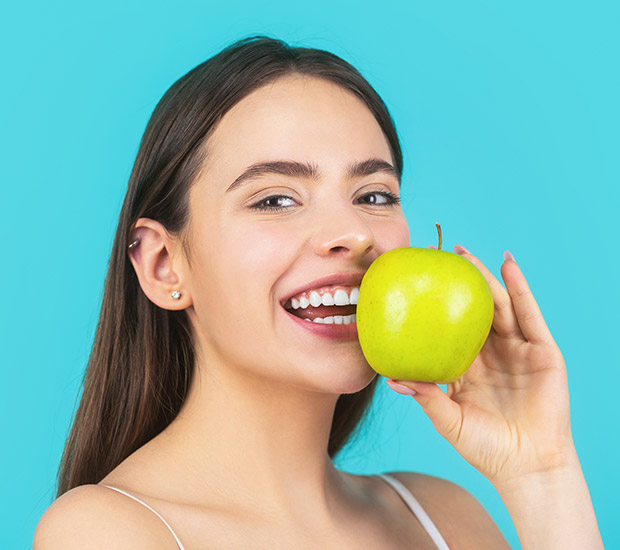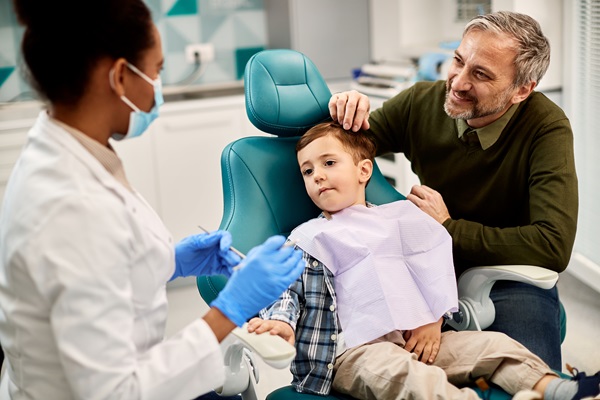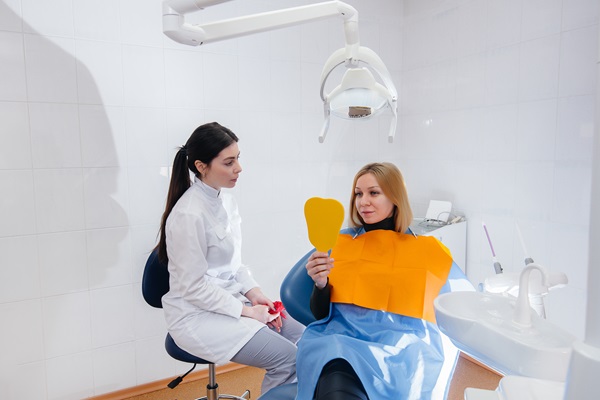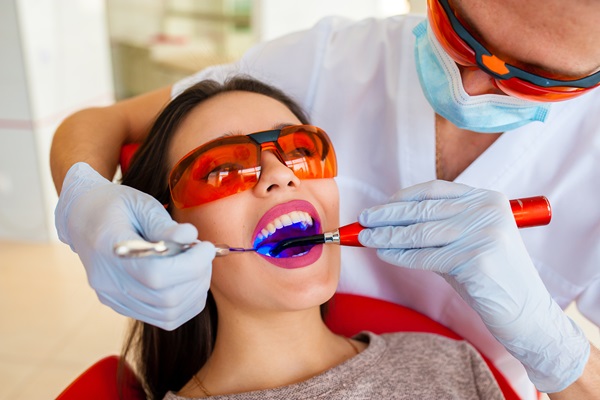Probiotics and Prebiotics in DentalCoral Gables, FL
The general public has long known about the benefits of probiotics and prebiotics for gut and gastrointestinal health. Research is now showing promising results of pro and prebiotics in relation to oral health and its impact on patients’ general health. Pro and prebiotics serve different functions but have shown significant health benefits to the oral cavity when taken simultaneously during dental treatment.
The prevention of bad bacteria is essential in promoting a healthy mouth. A balanced microbial environment in the oral cavity prevents disease and curbs decay while also enhancing the body’s overall health. The mouth is essentially a gateway to the rest of the body and its organs; limiting the amount of bacteria that enter the body can greatly reduce many health conditions.
Probiotics and prebiotics are available at Bushdid Smiles in Coral Gables and the surrounding area. Our staff can help you learn more about the procedure you are undergoing and answer any questions you may have. Call us at (305) 740-1443 to schedule a consultation appointment today.
Differences Between Probiotics and Prebiotics
The main difference between probiotics and prebiotics is one is alive and the other is not. Probiotics are live organisms that carry health benefits and are similar to naturally living organisms in the body. They are non-toxic and benefit the host organism by reproducing bacteria in the mouth and oral cavity that help the body stay healthy.
Prebiotics are dietary supplements that favor and increase the growth of good bacteria over bad bacteria. According to Oral DNA Labs, “They empower your existing good bacteria (or good bacteria introduced through probiotics) to survive and establish a balanced ration of good-to-bad bacteria using nutrients to influence the oral environment.” The relationship between pro- and prebiotics is similar to a seed (probiotic) and fertilizer (prebiotic); one is necessary to charge the other.
“The main difference between probiotics and prebiotics is one is alive and the other is not.”
Connection Between Probiotics and Oral Health
The oral cavity is home to a large amount of bacteria, many of which lead to diseases of the mouth and other organs. In fact, a special issue in Aegis on oral microbial wellness found, “Bacteria are a major component of the oral environment where more than 800 different microbial species co-exist, making the oral cavity the most diverse microbial population of the body.” Probiotics aid in killing biofilm and plaque buildup, the main causes of bacterial diseases and infections.
Many new dental strategies involving the manipulation of good oral microbiota, which are provided by probiotics, have been implemented to prevent oral diseases. That is, many dentists, especially complete health dentists, have incorporated the use of probiotics to aid in creating a more bacterially-healthy oral environment in some patients. Patients who take probiotics orally have also seen a tremendous difference in their oral and general health.
“Probiotics aid in killing biofilm and plaque buildup, the main causes of bacterial diseases and infections.”
How to Increase Prebiotics in Diet
Prebiotics have active agents that stimulate the growth of probiotics in the oral cavity and gut. They are natural sugars and fibers that work with healthy bacteria and yeast to promote health. Medical News Today lists the most common foods that contain prebiotics as fruits, vegetables, legumes, cereal grains, nuts, and seeds. Various types of these foods can include:
Fruits: bananas, custard apples, watermelon, grapefruit
Vegetables: chicory, artichokes, garlic, onions, shallots, leeks, cabbage
Legumes: chickpeas, lentils, red kidney beans, baked beans, soy beans
Cereal grains: bran, barley, oats
Nuts and seeds: almonds, pistachios, flaxseeds
“They are natural sugars and fibers that work with healthy bacteria and yeast to promote health.”
Benefits of Probiotics
Probiotics have the ability to eliminate bad bacteria while increasing the growth of beneficial bacteria. A study in the Dentistry Journal found that “the nature and composition of any individual microbiome impacts the general health, being a major contributor to oral health.” In turn, oral bacteria greatly contribute to general health and the functionality of various organ systems.
Healthline provides the major benefits of probiotics on oral health:
- They help prevent plaque
- Can help fight bad breath
- Can prevent oral cancers or reduce symptoms
- Manage symptoms of gingivitis
- Decrease inflammation of gum disease
Although these benefits are not guaranteed with all types of probiotics, beneficial factors increase with the use of them. Probiotics are also not harmful, and taking them only benefits the person as a heightened number of healthy bacteria leads to overall health.
“Probiotics have the ability to eliminate bad bacteria while increasing the growth of beneficial bacteria.”
Recommended Probiotics for Health Conditions
Choosing the right probiotic for a specific health condition may be difficult, but the most important factor to consider is it must contain live and active bacterial cultures. The packaging on any probiotics should indicate whether or not they contain live bacteria. It is important to research or ask a doctor about effective probiotics for a specific health condition.
Gut Health
The most common use of probiotics is for gut and gastrointestinal health as one of the leading homes for microorganisms is the gut. Renew Life Ultimate Flora Extra Care Probiotics, Seed’s Daily Synbiotic, and Jarrow Formulas Ideal Bowel Support are well-known probiotics for the gut. These probiotics improve IBS symptoms, relieve constipation, and mitigate diarrhea.
Gum & Periodontal Disease
Gum and periodontal disease are common effects of harmful bacteria buildup, plaque, and tartar. Probiotics eliminate harmful bacteria in the mouth and reduce the amount that enters the body through various pathways. L. reuteri and L. brevis probiotics work well for gum and periodontal disease.
General Health
Probiotics are effective for all people, whether or not their health is at risk. Decreasing the amount of harmful bacteria and increasing healthy bacteria only reduces the likelihood of diseases and illnesses. Eating a probiotic-rich diet (found mostly in dairy products) and taking general health probiotics such as GNC Ultra 25 Probiotic Complex, Now Foods Probiotic-10, and 21st Century Acidophilus Probiotic Blend can help boost general health.
“Choosing the right probiotic for a specific health condition may be difficult, but the most important factor to consider is it must contain live and active bacterial cultures.”
Consult With Us
If you are looking for more information pertaining to complete health dentistry or the use of prebiotics and probiotics for oral health, call us at (305) 740-1443 to speak to Dr. Bushdid.
Questions Answered on This Page
Q. What is the difference between probiotics and prebiotics?
Q. What is the connection between probiotics and oral health?
Q. How can I increase prebiotics in my diet?
Frequently Asked Questions About Probiotics and Prebiotics
What is the recommended dose when taking probiotics?
The recommended dose of any probiotic should be indicated on the packaging label. Each body is different and has a certain amount of live and active bacteria at any given time. Different probiotics can be effective at different levels. Thus, a product containing a higher number of live probiotics may not be better than one with fewer.
Can prebiotics be taken orally?
Yes, prebiotics are available in pill and powder forms. They are mostly present in our foods and naturally stimulate probiotics in our system. Prebiotics can be found most commonly in yogurt.
Do all probiotics function in the same way?
No, different probiotics serve different body systems and function in different ways. Probiotics are described by their genus (e.g., Lactobacillus), their species (e.g.,rhamnosus) and their strain (e.g., GG). This degree of specificity in describing a probiotic is essential since functions can be strain-specific. For example, Lactobacillus rhamnosus GG may have different effects from L. rhamnosus GR-1.
Are dry probiotics still considered “alive”?
Many probiotics come in a powder form. Bacteria that are dried and stabilized correctly are in fact still alive but are considered dormant and inactive. They start to grow gradually after being placed in a moist environment.
Are probiotics more effective when consumed in foods or pill form?
Many foods, especially dairy products, contain probiotics, so it is inevitable that a person consumes much of the probiotics from food. Food sources of probiotics have the advantage of offering good nutrition along with the probiotic bacteria. However, supplements can be more convenient for some people and may provide higher levels of healthy bacteria, depending on the specific product.





